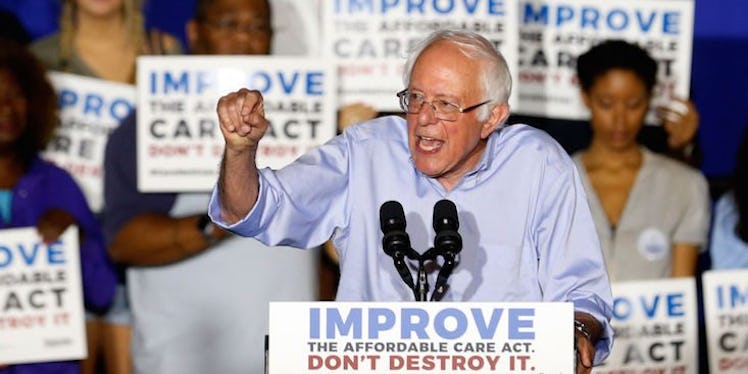
Bernie Sanders Wants Medicare For All, And This Is What That Means For You
2017 is the year of health care proposals in Congress, and now Senator Bernie Sanders is bringing his own idea to the table. On Wednesday, Sept. 13, Sanders is introducing Medicare for All, a health care plan. He has the support of several other high-profile senators, but that doesn't exactly mean that this bill has any chance of passing, given that Republicans are the majority in Congress right now.
But Sanders' moves aren't particularly always about reality. Like haute couture, Sanders presents the grand, more experimental ideas in the hopes that they can become more mainstream and, one day, a reality. As such, like most others of Sanders' plans, the exact way for which this plan would be paid in the real world is still up in the air.
However, the important thing here is that this is a plan being presented by high-profile Democrats, so it could pop up again come the 2020 presidential election. So even though it's not likely to actually become law anytime soon, let's make an effort to understand what Medicare for All really means.
The Medicare for All Act of 2017 is "basically" a single-payer option, a Sanders aide told Quartz. It would work to provide universal health coverage, which is what a lot of developed countries that are not the United States have.
OK great, but what does "single-payer" and "universal coverage" like, actually mean?
The basic idea is that everyone should automatically have health insurance.
Alright so, what we have right now in place is a bunch of private companies (i.e. not the government) giving insurance to people. There's also a thing called Medicare, which is insurance from the government currently for people over the age of 65 and some people who have disabilities.
Sanders wants "Medicare for All," which means that everybody would be able to get insurance from the government. Under Sanders' plans, enrollment would be automatic and everyone would have the same coverage "typically without any co-pays," the aide told Quartz.
The Affordable Care Act (ACA, aka Obamacare) was designed to encourage everybody to get insurance. Medicare for All would automatically give everybody insurance.
Still with me? OK.
This would be a big overhaul of the current insurance system. To deal with that, there would be a four-year transition period, according to CNN.
It would be paid for by higher taxes, but exactly what those taxes would be would be figured out in another bill in the future, according to The Washington Post.
What would Medicare for All cover?
Sanders' plan would have everyone getting a "Universal Medicare card," according to CNN. You could use that for hospital stays, doctor appointments, substance abuse treatment, dental, vision, and reproductive care. So yeah, contraceptives and pap smears and all those nasty but great things that keep people with vaginas and/or uteruses healthy and happy.
Lots of reproductive groups are super jazzed about Sanders' idea because it would also cover abortions. Ilyse Hogue, president of NARAL Pro-Choice America, said in a statement,
The senator's work to draft this legislation is a groundbreaking advancement for a simple truth: we will never solve our healthcare crisis until women have full access to reproductive services. The introduction of this bill is the culmination of significant work led by women of color, who suffer the most when contraception and abortion care are offered on a pay-to-play basis.
Who is backing this idea with Sanders?
Oh my gosh, like, everybody who's anybody (or wants to be an anybody).
Co-sponsors with Sanders include Senators Kamala Harris, Elizabeth Warren, Cory Booker, Kirsten Gillibrand, Jeff Merkley, Sheldon Whitehouse, Brian Schatz, Mazie Hirono, Ed Markey, Al Franken, Tammy Baldwin, and Richard Blumenthal.
If those names sound familiar, it's because they want their names to sound familiar to you, because a whole bunch of these people are rumored to be gearing up for a presidential election run in 2020.
But how much should you actually care about this?
Ultimately, there's like a 0.02 percent chance that this thing will end up your new insurance plan in the next few months, so in the short-term, you technically don't have to care that much if you don't want to.
But, these are long-term ideas at play here, and an idea like this might be something you want to consider when making calls to your representatives or getting to the voting booth in local elections. The Republicans are still tripping along trying to make their own health care plan, and it's important to understand all alternative options.
"We remain the only major country on earth that allows chief executives and stockholders in the health care industry to get incredibly rich, while tens of millions of people suffer because they can't get the health care they need," Sanders wrote in an op-ed for The New York Times on Sept. 13. It's something to consider, even if it won't actually change your life in the immediate future.